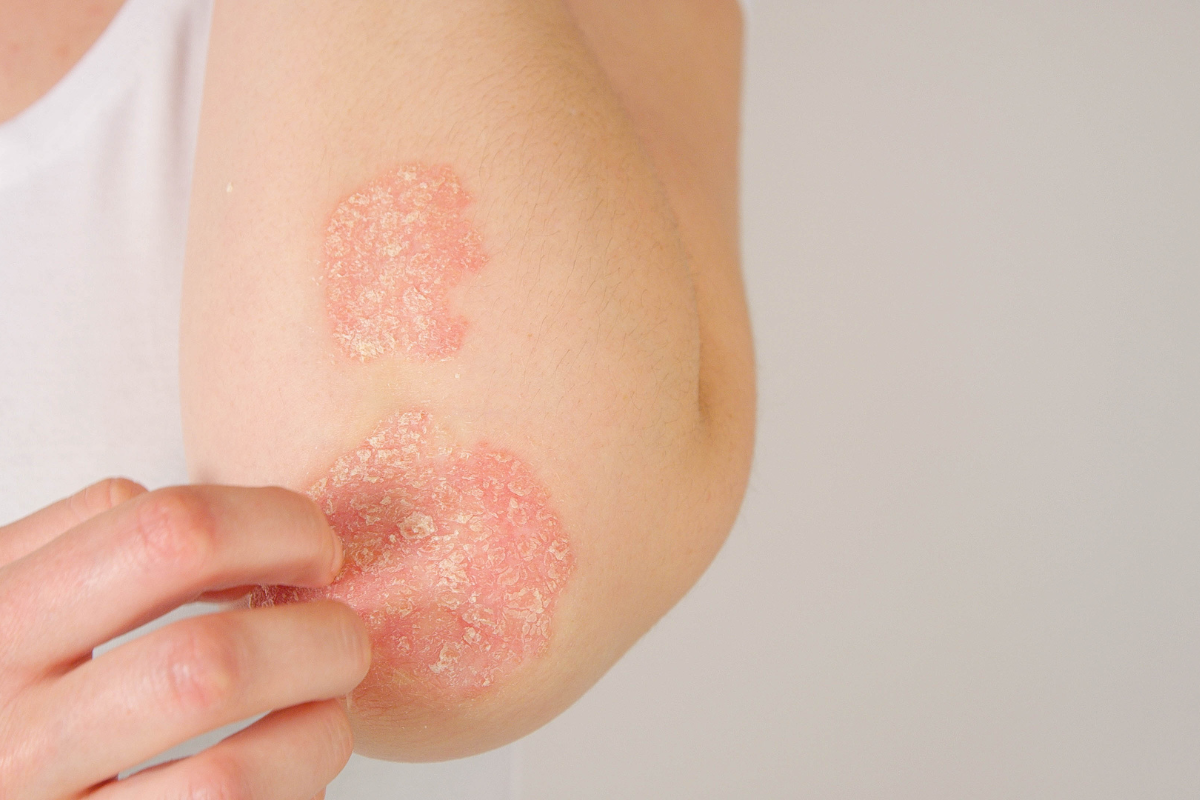Collagen, psoriasis & eczema

Collagen, psoriasis & eczema
Collagen's ability to reduce inflammation can help reduce the severity of psoriasis and other types of eczema on the skin. B vitamins such as vitamin B12 (cobalamin), vitamin B9 (folate), vitamin B7 (biotin), as well as vitamin D and vitamin C can also help with eczema or psoriasis on the skin.
Silica is also anti-inflammatory. This means that silica can help relieve the symptoms of psoriasis and eczema.
Skin problems are rarely skin problems - but your problem skin may be due to a weakened immune system or intestinal inflammation.
Psoriasis and eczema in themselves do not weaken the immune system, but they are a sign that the immune system is not working properly. Anything that triggers the immune system can cause psoriasis and eczema to flare up. At a basic level, psoriasis and eczema are a disorder of the immune system. White blood cells become overactive and produce excess cytokines, which trigger inflammation in the skin and other organs. A collagen supplement for the immune system can therefore counteract flare-ups of eczema and psoriasis.
Eczema and psoriasis are directly related to chronic intestinal inflammation, also known as leaky gut. If your skin problems are due to inflammation in the intestine, a collagen supplement for the stomach and intestines can relieve your eczema and psoriasis skin problems.
Can collagen help treat psoriasis and eczema?
Psoriasis causes itchy patches and discolored skin that flakes. Psoriasis treatment usually includes creams and gels that can help with:
- target overproduction of skin cells
- minimize the appearance of flaky skin
- reduce inflammation and skin discoloration
But these methods don't work well for everyone, so many people try other alternative solutions, such as supplements with collagen, silicon, and vitamin C , and other supplements like biotin, B12, folic acid, and vitamin D.
Collagen's ability to reduce inflammation may help reduce the severity of psoriasis and other types of eczema.
Why is silicon good for psoriasis and eczema?
Silica helps metabolize other minerals and balance hormones. Additionally, since both silica and collagen are anti-inflammatory, they can soothe skin conditions like eczema and psoriasis.
What is collagen?
Collagen is a protein that provides strength and firmness to many parts of the body, such as bones, skin, muscles and connective tissue.
In fact, collagen is the most common protein in the human body, and also in the entire animal kingdom.
Your body produces its own collagen, known as endogenous collagen. However, this body's own production of collagen decreases significantly after the age of 25. Collagen that comes from outside the body, in the form of dietary supplements, is called exogenous collagen.
Collagen serves many important functions, including:
- keep skin elastic
- contribute to bone density
- strengthen hair and nails
- support healthy joints
- strengthen ligaments and tendons
- contribute to wound healing
- support a leaky gut
How can collagen relieve psoriasis symptoms?
Collagen may have some benefits for psoriasis treatment.
- It may help reduce inflammation in the skin. The skin plaques that form in psoriasis are believed to be caused by inflammation, which can have long-term health consequences.
About 30% of all people with psoriasis go on to develop psoriatic arthritis, which involves joint inflammation.
Here are some new research findings regarding collagen as a treatment for inflammation:
- The anti-inflammatory properties of the amino acids in collagen may help reduce inflammation in arthritis.
- Collagen plays an important role in wound healing, including reducing inflammation and supporting the growth of new skin.
- Several studies link psoriasis to other inflammatory conditions, including IBD (inflammatory bowel disease) and diabetes, so reducing inflammation throughout the body can effectively help treat psoriasis. * Inflammatory bowel disease includes:
- Ulcerative colitis
- Crohn's disease
- Unclassified colitis
- It can improve skin elasticity.
- Collagen has a well-known role in supporting skin health. In particular, the amino acids in collagen promote the growth of strong, healthy skin.
- Collagen can also help reduce the appearance of wrinkles by increasing the density of collagen in the skin - collagen-dense skin is less prone to deep wrinkles and visible lines.
In fact, many people take collagen supplements to maintain skin elasticity and keep their skin smooth and youthful.
A collagen supplement can help you maintain the health of your skin while you use the treatments recommended by your dermatologist for psoriasis or other types of eczema.
The best supplements for treating psoriasis and other types of eczema are collagen peptides along with vitamin C as well as biotin (vitamin B7), vitamin B12 (cobalamin), folic acid (vitamin B9), and vitamin D.
While collagen injections may help reduce visual signs of skin aging, no research supports the use of collagen injections to treat psoriasis or eczema.
Collagen supplements are the best option for getting more collagen into your system. A good amount of collagen is around 10 grams of collagen per serving.
Are there any risks to eating collagen when you have eczema or psoriasis?
In general, experts believe that collagen is quite safe for most people to take. Some research suggests that collagen has the side effect of reducing appetite. Which can be a positive side effect for some people.
And since all naturally occurring collagen is animal-based, it is not suitable for vegetarian or vegan diets. However, some people who follow plant-based diets take vegan collagen (made from GMOs) or so-called collagen boosters that are supposed to boost the body's own collagen production. Note that if a collagen is vegan, it is never natural, but manufactured in a laboratory. Natural collagen is ALWAYS animal-based.
Is vitamin D good for relieving psoriasis?
Celloptimum’s vegan vitamin D3 supplement can be comparable to prescription psoriasis treatments like corticosteroids. Vitamin D is created by the body when exposed to sunlight and is essential for our overall health. Vitamin D deficiencies have been linked to psoriasis, although it has not been proven to be directly related. One of the biggest benefits of vitamin D is its immune-boosting powers. People with psoriasis can benefit from keeping their immune system as healthy as possible to improve their autoimmune response. If you want to increase your vitamin D intake, take a vitamin D supplement, get out in the sun, and eat foods rich in vitamin D like cheese, egg yolks, and fatty fish.
Is biotin good for psoriasis?
Biotin (vitamin B7) has been shown to help improve symptoms of psoriasis and eczema. Biotin deficiency is rare and has not been directly linked to healing psoriasis. That said, biotin supplements can help build a healthy foundation for skin health. You may find that biotin supplements, which support healthy cell growth, help relieve symptoms of skin conditions like psoriasis and eczema.
Can a vitamin B12 deficiency be linked to psoriasis?
B12 deficiencies in the body may be linked to psoriasis. Cobalamin (vitamin B12) has been shown to help improve symptoms of psoriasis and eczema. Vitamin B12 is found in most animal products, but vegetarians can find plant-based foods fortified with vitamin B12, or take a vegan vitamin B12 supplement.
Can too much vitamin B12 cause common skin problems like eczema, rosacea, and acne?
More is not always better when it comes to your skin health. Research has shown that too much vitamin B12 can lead to problems such as vitiligo (skin discoloration), atopic dermatitis (eczema), rosacea (both mild and severe), and acne. You should never take megadoses of this B vitamin. Megadoses are doses of over 700 micrograms per day. Celloptimum's vitamin B-12 contains 125 micrograms per daily dose.
Can folate deficiency be linked to psoriasis?
Low blood levels of folic acid have been reported in psoriasis, partly due to its consumption through increased cell turnover in the skin and partly due to reduced absorption in the intestine.
Why is vitamin C good for psoriasis?
Vitamin C - Oxidative stress occurs when the body has an imbalance between free radicals and antioxidants. Oxidative stress has been shown to increase in the body while fighting psoriasis and eczema. Increased levels of vitamin C in the body have been shown to help control oxidation in the body.
All of our collagen supplements contain extra vitamin C.
Can a collagen supplement for the immune system be good for psoriasis and eczema?
Psoriasis may be a skin condition, but its causes usually run much deeper, with its roots in inflammation and your immune response. In other words, a pure collagen supplement alone is unlikely to cure psoriasis, but it is a great complement. Our collagen supplement for immune support contains collagen peptides along with NAC ( N-acetylcysteine) , selenium, vitamin D, cobalamin (B12), vitamin C, zinc, pyridoxine (B6) and folic acid (B9).
NAC ( N-acetylcysteine) counteracts inflammatory skin diseases, including psoriasis and eczema.
However, collagen along with certain vitamins and minerals benefits your skin and helps calm inflammation along with a nutritious and anti-inflammatory diet.
Can a collagen supplement for the stomach and intestines improve eczema and other skin problems like psoriasis?
Atopic dermatitis, commonly known as atopic eczema, is classified as red, itchy, sometimes painful skin. Atopic eczema is one of the most common skin diseases globally and in Sweden affects 20% of all children. It can occur in people of all ages - from infants to the elderly. Skin pathology can be due to poor gut health, systemic inflammation and an overloaded liver.
Eczema, rosacea, and psoriasis are directly related to chronic intestinal inflammation, also known as leaky gut. This inflammation of the intestines doesn’t just manifest as indigestion, gas, diarrhea, or constipation. Often, the skin is the more sensitive and expressive organ. This is due to two primary causes – intestinal inflammation which reduces overall vitamin D levels in the body and the type of immune responses that are unleashed.
Inflamed intestinal tissue requires more vitamin D to heal and maintain tissue turnover. Vitamin D is therefore crucial for skin health. Vitamin D deficiency can be a contributing factor to redness (rosacea), flaky skin, eczema, psoriasis and acne.
Taking a collagen supplement for the stomach along with vitamin D can go a long way in relieving eczema and psoriasis.
Can eczema and psoriasis occur due to inflamed intestines (leaky gut)?
Gut inflammation overactivates certain cytokines (chemical messengers made by your immune system in response to inflammation), resulting in an exaggerated immune response that overloads the liver. This in turn leads to skin inflammation such as eczema.
A clean diet is the most important thing for healing the skin, but sometimes it is necessary to support the liver as well. The liver takes care of the “immune storm”, called oxidative stress, that results from a leaky gut. The liver uses glutathione, which is the main antioxidant pathway, to counteract this oxidative stress. NAC (N-acetylcysteine) is an amino acid that supports the body’s glutathione production.
NAC contains the sulfur-containing amino acid cysteine. Cysteine has several roles in the body, supporting detoxification, liver function, and as mentioned for the formation of one of our most important antioxidants, glutathione. A dietary supplement with NAC therefore supports the body's levels of glutathione.
In addition, N-acetylcysteine is also involved in the synthesis of keratin – the protein found in connective tissue, skin, hair and nails.
Vitamin C plays an important role in maintaining glutathione levels. For this reason, vitamin C supplementation can help increase glutathione levels in your body, which helps the liver counteract these immune reactions that can result in eczema and psoriasis.
Skin problems are rarely skin problems. It’s tempting to think that conditions like eczema, psoriasis, rosacea, acne, and itchy, red, flaky patches are problems that arise from the skin itself, but organ systems including the digestive system and liver can be the root cause of eczema and psoriasis. Understanding how the body expresses inflammation and imbalances in these systems will help you understand why your particular skin problems are occurring.
- Tags: Hud/Skin Kollagen/Collagen








